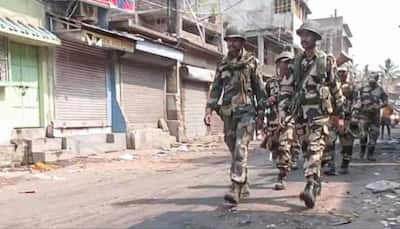Fresh details have emerged from West Bengal’s Murshidabad, where violence over the Waqf (Amendment) law has led to over 200 arrests, a senior state police official said on Monday. In the meantime, tension surfaced at the minority-dominated Bhangar Assembly constituency in the South 24 Parganas district of West Bengal on Monday afternoon.
Nilotpal Kumar Pandey, Deputy Inspector General and PRO of the Border Security Force (BSF) for the South Bengal frontier, on Monday said that the protestors attacked the Central Armed Police Force (CAPF) personnel with stones and burning bottles in Murshidabad. He mentioned that the CAPF personnel are working in close coordination with the police to keep the situation in Murshidabad under control.
Several areas in the district witnessed violent protests over the newly-promulgated Waqf (Amendment) Act last week, with Hindus being subjected to targeted violence in particular.
Several vehicles, including police vans, were set on fire, stones were hurled at security forces, and roads were blocked as violence rocked various parts of the state, particularly Murshidabad, during protests over the new legislation on Friday. Some flare-ups were also reported on Saturday.
1. Confirming that the arrests on this count have crossed 200, Additional Director General (Law and Order) of State Police Javed Shamim said the situation in the troubled pockets in both Murshidabad and Malda districts is more or less normal now.
2. “The route marches in the troubled areas are being conducted continuously. Senior police officials are there at the spot. The situation is fast becoming normal. The shops and establishments have started opening,” news agency IANS quoted Shamim as saying.
3. However, he added that there are attempts to spread rumours about the situation by some vested interests from other states, and to prevent that spreading of rumours, Internet services have been suspended for the time being in certain areas. He also said that the process of ensuring the return of the displaced persons to their homes has already started.
4. Detailing the events, DIG Pandey told IANS that on Friday, two BSF companies were deployed after the initial reports of the situation turning tense. “On Friday, when the situation worsened, at the request of the administration, we immediately deployed the BSF. Wherever we could, we mobilised our troops from the nearest location. On Friday, we provided approximately two companies and were deployed to areas experiencing tension and disturbance,” he said. He added that as the violence escalated, the force was compelled to increase its presence with a deployment of nine companies in the violence-hit areas.
5. Clashes broke out between the cops and the supporters of the All India Secular Front (AISF) from Bhangar after the latter were stopped from approaching the venue of their protests in Kolkata against the Waqf (Amendment) Act.
6. The AISF supporters blocked the Basanti Highway in protest, following which the traffic movement there got heavily disrupted. The AISF activists refused to refrain from blocking the highways despite repeated requests from the police.
7. The AISF legislator from Bhangar, Nausad Siddique, who is his party’s lone representative in the state Assembly, said the police are mainly responsible for spreading tension over the Waqf issue. “This is just to divert attention from the public unrest over the recent cancellation of 25,753 school jobs following an order of the Supreme Court. We were stopped unnecessarily, and the police deliberately did it to create tension. We will go the legal way in the matter,” he said.
Stay informed on all the , real-time updates, and follow all the important headlines in and on Zee News.







